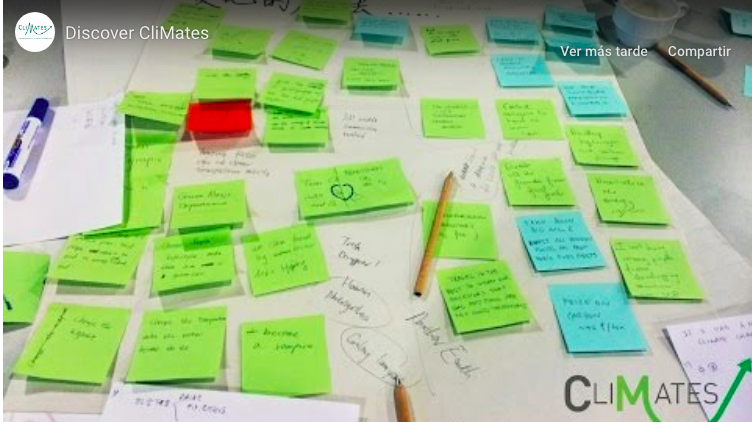CliMates is a member of the Civil Society representatives at the World Summit Climate and Territories, carrying the voice of youth to more than 1700 cities at the Summit.
On the 23rd of April, CliMates presented its involvement in the World Summit on Climate & Territories during at their press conference at the French Senate.
This summit took place on the 1st and 2nd of July in the south of France, gathering people from local governments from all over the world. It was a major milestone for dialogue and collective work in the run up to COP21 considering that the mobilization of Non-State Actors is one of the key features for this COP’s success.
The voices of non-State actors rose again on the path to COP21. After the Business and Climate Summit on 20th-21st May, which gathered hundreds of CEOs of multinationals asking for a strong price on carbon, the World Summit on Climate and Territories, organized in Lyon on July 1st-2nd 2015, assembled hundreds of non-state actors, including local authorities’ representatives, NGOs, private consultants and researchers, to draft all together a common declaration of engagement and a set of recommandations addressed to national governments. As this year, this Summit is the most important event aimed at giving a voice to civil society, together with local authorities, a couple of months before the COP21.
Are this Summit and its results game-changing in the fight against climate change? How important are territories and local actions in front of this global challenge? The last report of UN-Habitat “Cities and Climate Change” indicates that cities are the most important pollution centers of the planet, responsible for 70% of global GHG, while they only occupy 2% of the lands. The role of local authorities is therefore absolutely crucial, both in terms of practical implementation of national guidelines and as social and environmental innovation laboratories to reduce their own pollution.
Several important announcements were made during this Summit in this regard. President François Hollande and Minister Laurent Fabius, President of COP21, officially ensured that they would negotiate to allow local authorities – and not only States – to receive fundings from the Green Fund.
Yet, local authorities are not waiting for the Green Fund to act on their own. A representant from the Carbonn Climate Registry declared that, so far, 212 cities have already committed in NAZCA to reduce all together around 1 billion tCO2eq by 2020: this is equal to the total GHG reductions of the European Union between 1990 and 2012!
The Subnational Global Climate Leadership Memorandum of Understanding (Under 2 MOU) was officially launched during the Summit: a total of 16 regions, states and provinces so far joined this first-of-its-kind agreement to reduce GHG emissions by 80-95% below 1990 level by 2050. This goes hand in hand with the commitments of numerous global cities’ networks, among which the Carbon Neutral Cities Alliance launched in 2014, which shares the same reduction objective.
During the Summit, twenty recommandations came out of ten workshops, which allowed the interested participants to contribute to the drafting of the final declaration. Here are the most striking ones. CliMates’ president Delphine Blumereau, presenter of the declaration on education, asked to « assign spending for environmental education within local authorities in consultation with civil society actors” and “develop environmental education for every public, and within youth public policies, by fostering experimentation, creativity and participation ». Furthermore, it was suggested to create an online platform within the UNFCCC gathering education on environment and climate change actions around the world, based on the NAZCA model. Concerning energy, local authorities asked to be given mandates to settle local innovative energy systems and divestment initiatives from fissible and fossil energies. The Urban Mobility workshop ensured that it was possible to « reduce GhG of the sector by 50 to 75% by 2050 and improve the quality of life ». A proposition « to focus on vulnerable and poor people, and territories » was asked by the Climate Finance’s workshop. The participants to the Low Carbon Economy workshop asked for « a fair transition to sustainability jobs through social dialogue and collective intelligence ».
Agro-ecology was advocated for agriculture, while the « respect of human rights, cultural values and traditions towards forests » was proven necessary to protect the forests by a representative of the COICA, the federation of indigenous communities living in the Amazon forest.
All the recommendations of this Summit share one common principle: citizen information, training, and engagement should be at the core of every local policy. This Summit highlighted a fundamental point, too often played down: sustainable development is not only about the integration of social, economic and environmental considerations into every individual and collective decision-making processes but it is mostly about citizens’ engagement and re-appropriation of their own territory (urban, rural, or forests), energy, mobility, education, etc. through the exercise of their political power, alongside with governors.
Combining a system based on political representation with participative democracy is far from easy: from inclusive consultation, bottom-up approach, to direct democracy, this Summit has also been a first attempt to share the best examples of sustainable policies from around the world. And it definitely needs to be amplified and renewed.
The Summit has two objectives:
- Present concrete commitments from a whole range of territorial players: the greenhouse gas emission reduction announcements made in Lyon will contribute to developing a credible path to limiting global warming to 2°C.
- Submit specific proposals for commitments from non-state actors to be acknowledged in a bold climate agreement in Paris.
The commitments and proposals presented at the World Summit Climate & Territories will be submitted to the French Presidency of COP21 and to all the parties to the United Framework Convention on Climate Change.



